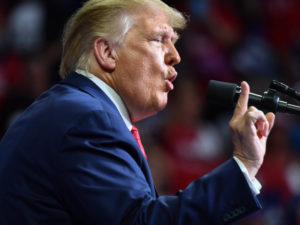 A federal appellate court on Wednesday limited an order that had blocked the nationwide implementation of a controversial wealth test for green cards and immigrant visas, allowing the Trump administration to continue the policy in every state except New York, Connecticut and Vermont.
A federal appellate court on Wednesday limited an order that had blocked the nationwide implementation of a controversial wealth test for green cards and immigrant visas, allowing the Trump administration to continue the policy in every state except New York, Connecticut and Vermont.
The U.S. Court of Appeals for the Second Circuit partially set aside last month’s ruling from a federal judge in New York, who said the so-called “public charge” test was hindering nationwide efforts to contain the coronavirus by discouraging immigrants from requesting public assistance, including medical treatment, during the pandemic.
U.S. Circuit Judge Peter Hall did not provide a reason in his one-paragraph order, which set aside the lower court injunction in every state but New York, Connecticut and Vermont. All three of those states had sued the Trump administration over the public charge rule.
Wednesday’s order is a temporary victory for the Trump administration and its public charge policy, the most sweeping restriction on legal immigration in recent years. The regulation by the U.S. Department of Homeland Security gives immigration officers more power to deny green card applications from people found to rely — or be at risk of relying — on government assistance, like housing vouchers and food stamps.
The rule was supposed to be implemented in October 2019 — but orders from federal judges delayed its enforcement until this February, after the Supreme Court intervened and set aside lower court injunctions.
In April, the attorneys general in New York, Connecticut and Vermont asked the Supreme Court to reconsider its decision, saying the public charge regulation was hurting immigrant communities hard-hit by the spreading coronavirus. The high court denied their request but left open the possibility for the states to pursue relief in lower courts.
To read this article in its entirety, please visit CBS News.
